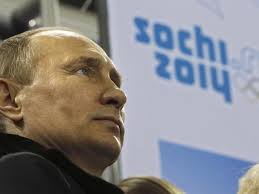By Mark Baber
August 27 – FIFA President Sepp Blatter is expecting a reply in the next few days from Russian authorities about the recently passed law banning “propaganda” to minors on “non-traditional relations.”
Opponents have branded the law, which has not yet been tested in a court of law, as an “anti-gay” law.
Talking to the Associated Press on Sunday, Blatter said that the office of Vladimir Putin had promised a reply to his request for evidence that the new law was about “protecting somebody and not discriminating” in the first days of September.
According to Blatter, the issue will be discussed at the October 3-4 meeting of the FIFA executive committee.
It is likely Blatter will receive a reply similar to that provided by the Russian government to the International Olympic Committee in response to their request for clarification about how the law would operate around the Winter Games in Sochi.
In that reply the Russian authorities emphasised that ‘Russia has committed itself to comply strictly with the provisions of the Olympic Charter and its fundamental principles, according to item 6 of which “any form of discrimination with regard to a country or a person on grounds of race, religion, politics, gender or otherwise is incompatible with belonging to the Olympic Movement.”
The Russian deputy Prime Minister also guaranteed that Russia would fulfil its obligations under the Olympic Charter and, “In particular, legislation of the Russian Federation does not stipulate any restrictions or differentiation of the rights and responsibilities of citizens on the basis of sexual orientation. Discrimination against sexual minorities, just as any other discrimination, is expressly forbidden by the Constitution of the Russian Federation.”
According to the Russian letter to the IOC the law against spreading propaganda in favour of non-traditional relations applies “equally to all persons, irrespective of their race, religion, gender, or sexual orientation, and cannot be regarded as discrimination based on sexual orientation.”
“These requirements do not attract any limitations for participants and spectators of the Olympic Winter Games in Sochi on their legal right of residence in the territory of the Russian Federation or participation in any events stipulated in the Games program that are contradictory to the Olympic Charter or universally recognized standards of international law on human rights.”
Whilst some Russian proponents of the new law undoubtedly wish to use it as a wedge to introduce more discrimination, it is clear that international pressure and sporting authorities can play a role to play in ensuring that Russia, which wishes to be judged by high standards of human rights, does not slide back into officially approved discriminatory practices.
Contact the writer of this story at moc.l1745524923labto1745524923ofdlr1745524923owedi1745524923sni@r1745524923ebab.1745524923kram1745524923

